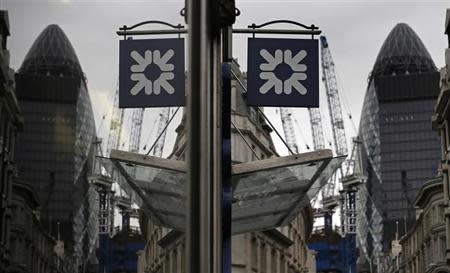RBS names revamp specialist to oversee bad bank, flotations

By Matt Scuffham LONDON (Reuters) - Royal Bank of Scotland has named Rory Cullinan, who led the drive to cut back the bank's risky loans, to run its new "bad bank" and manage the stock market flotations for its U.S. bank Citizens and its William & Glyns network of branches. RBS, 82 percent-owned by the government, said Cullinan will lead its Capital Resolution Group (CRG), which will include the 38 billion pounds ($62 billion) of unwanted assets dubbed the bad bank, as well as the group's shipping business and the operations due to be spun off. The internal bad bank was announced last month as part of measures to bolster RBS's capital and speed up its eventual privatization. Cullinan, who had been expected to lead the bad bank, will oversee the sale of Citizens, which analysts have valued at between $9 billion and $15 billion. RBS is planning a partial initial public offering (IPO) of the business in the second half of 2014 and a full sale by the end of 2016. Cullinan will also take responsibility for offloading the Williams & Glyns business, comprising 314 branches, which RBS must sell under European state aid rules. An IPO of that business is targeted by 2016. RBS said on Wednesday its entire shipping business would be placed inside CRG and Cullinan would oversee its restructuring. However, a spokeswoman said the move didn't mean the bank planned to exit the shipping industry entirely. "It's the best way of coherently managing the business to move it under one executive to reset the strategy," she said. Last month, sources familiar with the matter told Reuters around $4 billion to $5 billion of shipping loans were expected to go into the bad bank, with the total shipping portfolio standing at an estimated $16 billion. RBS declined to comment on the size of the assets being transferred. Reporting to Cullinan, RBS's shipping boss, Lambros Varnavides, will continue to lead the business up until his retirement in June next year. As chief executive of the bank's non-core division, Cullinan has already played a key role in restructuring the bank, which was rescued through a 45 billion pound bailout that left the government with an 82 percent stake. He and previous chief executive Stephen Hester identified 258 billion pounds of RBS's most risky loans that would be sold off or wound down at the start of 2009, only 37 billion pounds of which remain on the bank's books. Hester's successor Ross McEwan will announce the results of a strategic review in February. ($1 = 0.6157 British pounds) (Additional reporting by Steve Slater and Jonathan Saul; Editing by Mark Potter)

